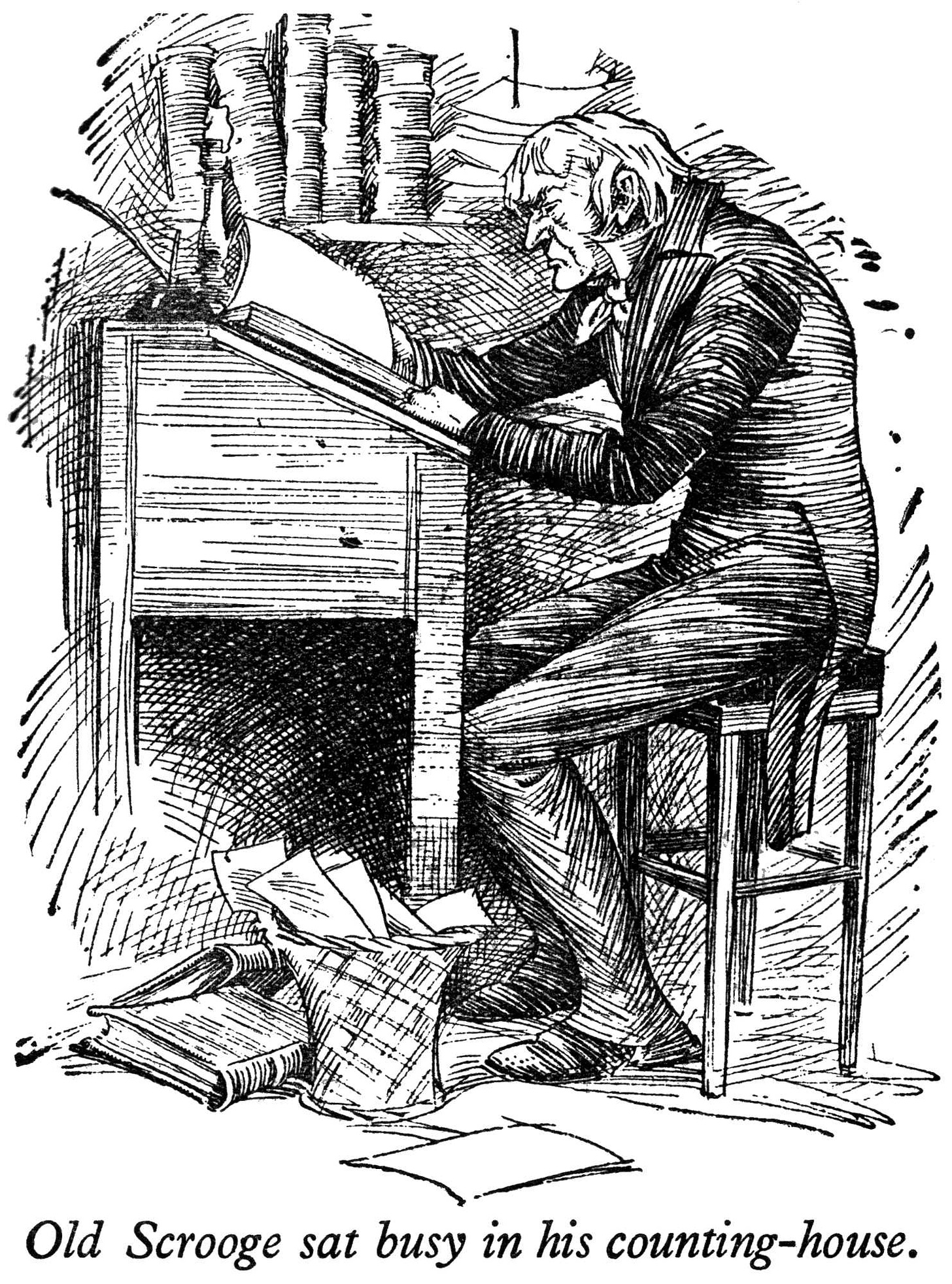Apple TV's Spirited and the Defanging of A Christmas Carol
Charles Dickens’ A Christmas Carol stands as the ur-piece of Christmas entertainment, spawning endless adaptations and imitators since its debut in 1843. This is somewhat surprising considering its explicit anti-capitalist politics.
The telling scene comes at the start of the book, when two men come to Scrooge’s office to ask for a donation for the poor. The old miser’s angry reply is redolent of Herbert Spencer:
“"Are there no prisons?" asked Scrooge.
"Plenty of prisons," said the gentleman, laying down the pen again.
"And the Union workhouses?" demanded Scrooge. "Are they still in operation?"
"They are. Still," returned the gentleman, "I wish I could say they were not."
"The Treadmill and the Poor Law are in full vigour, then?" said Scrooge.
"Both very busy, sir." […]
"I wish to be left alone," said Scrooge. "Since you ask me what I wish, gentlemen, that is my answer. I don't make merry myself at Christmas and I can't afford to make idle people merry. I help to support the establishments I have mentioned--they cost enough; and those who are badly off must go there."
"Many can't go there; and many would rather die."
"If they would rather die," said Scrooge, "they had better do it, and decrease the surplus population.””
Scrooge is a horrible person not because he is grumpy or miserly or doesn't like Christmas; he is an evil man because he values the making of money over the lives of others. He sees the poor suffering and responds by bitching about his taxes.
Scrooge later feels so low and guilty by the thought of Tiny Tim’s death because the ghost of Christmas present reminds him he had so callously called for the death of the '“surplus population.” It was easy for him to say those words, hard when confronted by what they actually meant. Scrooge suddenly realizes that there are real people who will die as a direct result of his greedy zeal to grow his wealth at all costs.
A Christmas Carol is perhaps the most popular and enduring anti-capitalist work of literature in the English language. The culture industry keeps reviving it, even though Chrsitmas has become the ultimate orgy of consumerist capitalism. A holiday that calls for the haves to give to the have-nots is now mostly about accumulating more and more useless dross. In this context A Christmas Carol is even more subversive than it was in 1843.
That’s why so many recent adaptations completely excise the original political message of the work. Apple TV’s Spirited, starring Ryan Reynolds and Will Ferrell, is the most recent and perhaps most flagrant example. It retells the story through a modern corporate exec, a la the 1980s film Scrooged. The new twist is that Reynolds’ exec is being haunted by none other than the ghost of Ebenezer Scrooge himself, played by Ferrell. The old miser has worked to save other like him in death, but Reynolds is a hard case.
His exec character ends up seducing the ghost of Christmas past, and keeps questioning the premise of the hauntings rather than changing his ways. In the original book, Scrooge is kind of a pathetic character. In this version, Reynolds is attractive and smarter than everyone else. Octavia Spencer plays his assistant, who unlike Cratchet is well-compensated. Despite the amorality of his business practices, Reynolds’ character is portrayed as an exceptional person who just needs to be kinder and prioritize his family a little more.
The Tiny Tim of the story is different, too. Reynolds encourages his niece to use the internet to smear the kid she is running against for student government, who kills himself after cyberbullying. This part actually got to me, but I also found it telling that the specter of inhuman capitalism is nowhere to be found. The evil here is social media bullying, which is indeed terrible, but divorced from the reality that large corporations profit from it and even encourage it via their algorithms. The story of exploitation in Dickens’ original is gone.
The modern Scrooge of Spirited is the kind of supposedly hyper-competent corporate executive type our media tells us to worship, which is why I am sure the bosses at Apple TV greenlit this production in the first place While the modern Scrooge character finally repents at the end, he is ultimately vindicated. Reynolds’ exec takes over the ghosts’ haunting operation, applying modern corporate jargon and management techniques. I’m not joking. At the very end, the man who was supposed to see the error of his ways gets to continue chasing the hustle in the afterlife, which the movie protrays as a good thing.
Despite some fine acting (the cast is pretty great) alluring visuals and fun songs, Spirited left me with a wretched taste in my mouth. With the awful consumerist Satyricon around me every Christmas season, I can rely on Dickens’ tale to remind me of the holiday’s radical potential. Now even that story serves the narrative that our jobs and buying crap are the sum total of our existence. Over forty years after the neoliberal turn there is still no alternative.



